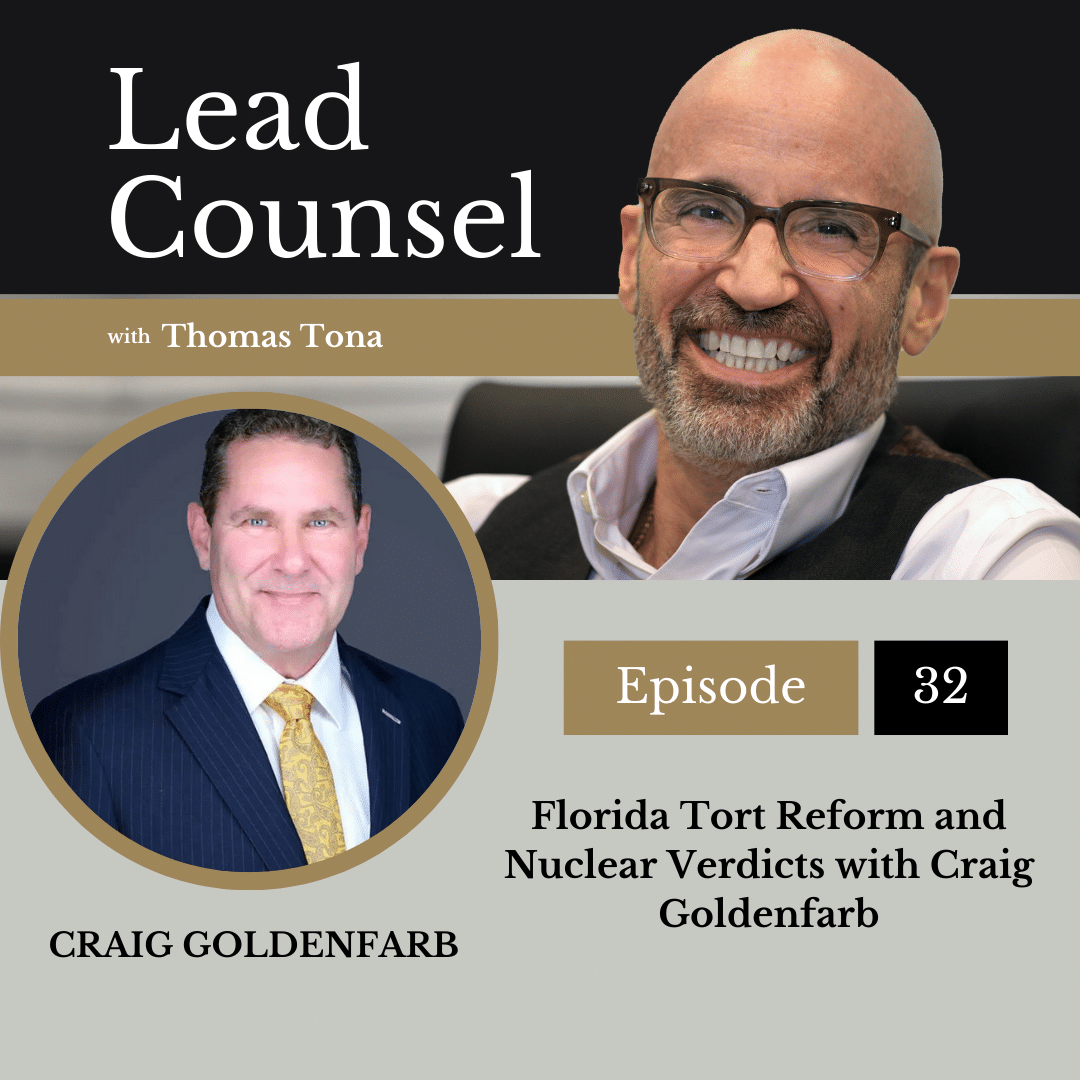Get ready for a great discussion with Craig Goldenfarb as we explore the far-reaching implications of the recent tort reform law in Florida. Goldenfarb offers a sharp analysis of how the law is reshaping the landscape of personal injury law, limiting what evidence can be shown to a jury, and causing a shift in the competitive landscape. We also examine how the reform has reduced the statute of limitations, causing a rush to file lawsuits and congesting the court system.
Goldenfarb exposes the underpinnings of the insurance industry’s involvement in pushing this legislation, revealing how they’re using their financial advantage over plaintiff’s attorneys to sway the legal process in their favor. Lastly, we don’t shy away from tackling the controversial topic of nuclear verdicts and how this law has contributed to their rise. We discuss the legal and ethical implications of these exorbitant jury awards, and Goldenfarb offers his insights on how collaboration among plaintiff’s attorneys challenges this system.
Join us as we peel back the layers of tort reform and its impact on personal injury law.
- Florida’s tort reform law, its impact on personal injury law, and how it’s reshaping the legal landscape.
- The insurance industry’s role in this legislation and how it exploits its financial standing over plaintiff’s attorneys.
- The political implications of the law, its potential impact on the upcoming presidential election, and the role of the GOP’s agenda.
- The contentious topic of nuclear verdicts, their ethical and legal implications, and how attorneys are challenging this system.
- How the tort reform law restricts the evidence that can be presented to a jury and its impact on the statute of limitations.
- How the law has affected the practice of personal injury law, insurance claims, and the legal process.
We’d love for you to follow us if you haven’t yet. Click that purple ‘+’ in the top right corner of your Apple Podcasts app. We’d love it even more if you could drop a review or 5-star rating over on Apple Podcasts. Simply select “Ratings and Reviews” and “Write a Review” then a quick line with your favorite part of the episode. It only takes a second and it helps spread the word about the podcast.
The recent tort reform in Florida has significantly reshaped the legal landscape, affecting personal injury law, insurance claims, and the overall legal process. This reform brings forth substantial implications for individuals involved in personal injury cases, insurance companies, and attorneys practicing in this domain.
- Reduction of the Statute of Limitations
The new law in Florida has halved the statute of limitations from four years to two. This implies that individuals now have less time to file lawsuits, causing a rush that can congest the court system. It forces people to file lawsuits hastily, possibly before their medical treatments are completed. This provision deprives people of their rights and compromises the efficiency of the judicial system.
- Limitations on Evidence Presentation
The tort reform has restricted the kind of evidence that can be presented to a jury in a personal injury case. Under the new law, only the amount paid by health insurance for medical bills can be shown to the jury instead of the full amount. This misrepresents the true cost of medical treatment and might result in lower compensation for future medical expenses.
- The Comparative Negligence Rule
Florida’s tort reform law has introduced a 50-50 threshold in comparative negligence cases. If a jury finds that a client was more than 50% at fault in an accident, they are not eligible for any compensation. This has serious implications for cases involving slip and fall accidents and car accidents, where fault attribution can be complex.
- Removal of Attorneys’ Fees in First Party Cases
Previously, insurance companies were required to pay the attorneys’ fees of successful claimants in first-party cases. However, the new law forces attorneys to sign on a contingency basis, meaning they receive a percentage of the recovery amount. This might discourage individuals from hiring attorneys due to the reduced compensation.
The insurance industry has played a significant role in pushing for this legislation. The new law favors insurance companies by limiting their liability and reducing their financial responsibilities. This could lead to delayed or denied claims, as insurance companies now have less financial pressure to settle claims promptly and fairly.
The tort reform has contributed to the rise of “nuclear verdicts” – large jury awards in personal injury cases. The law’s restrictions on evidence presentation and the comparative negligence rule can result in larger compensations awarded by juries. However, this system is being challenged by attorneys who argue that it unfairly advantages insurance companies.
Florida’s tort reform law has significantly impacted personal injury law and the broader legal landscape. It has sparked debates about the balance between protecting individuals’ rights to seek compensation and ensuring that insurance companies are not unfairly penalized. As the effects of this law continue to unfold, it is crucial for individuals and attorneys to stay informed and navigate these changes strategically.











